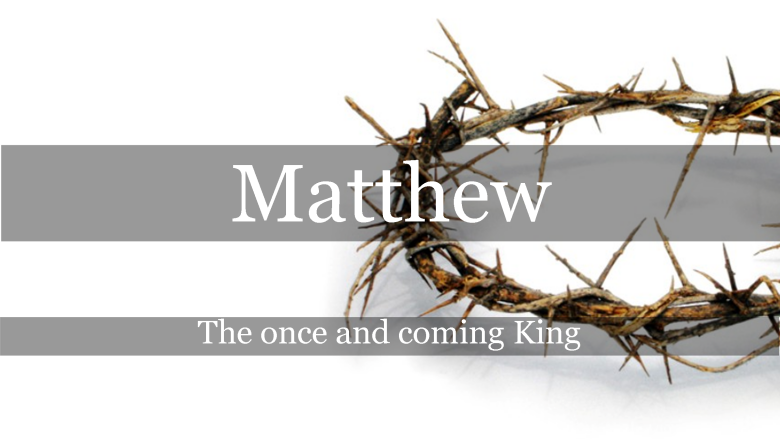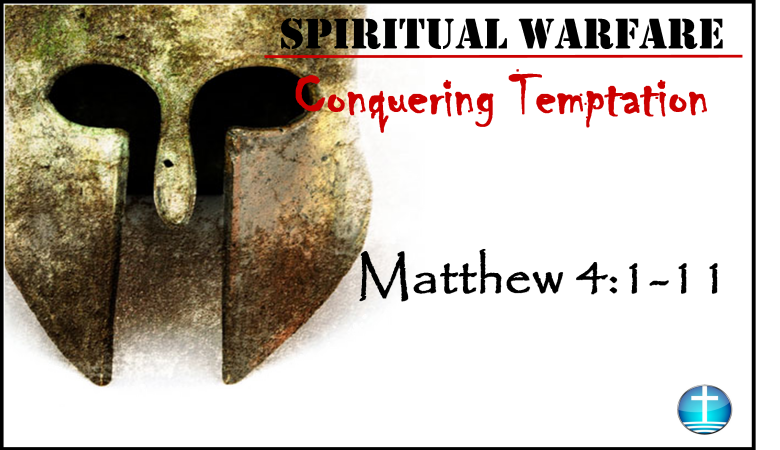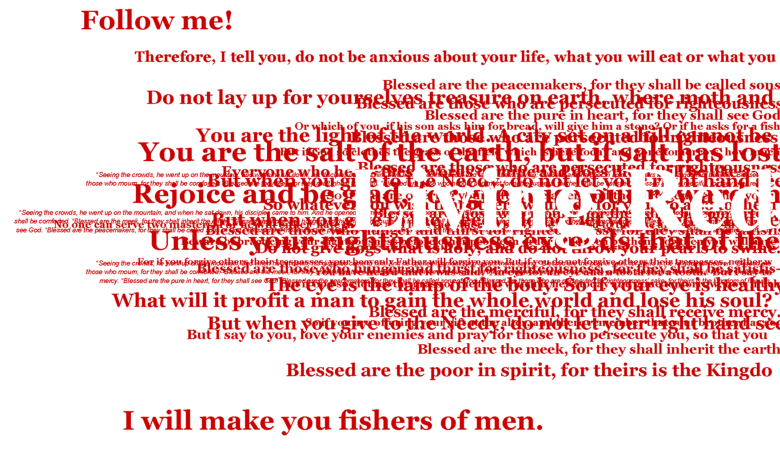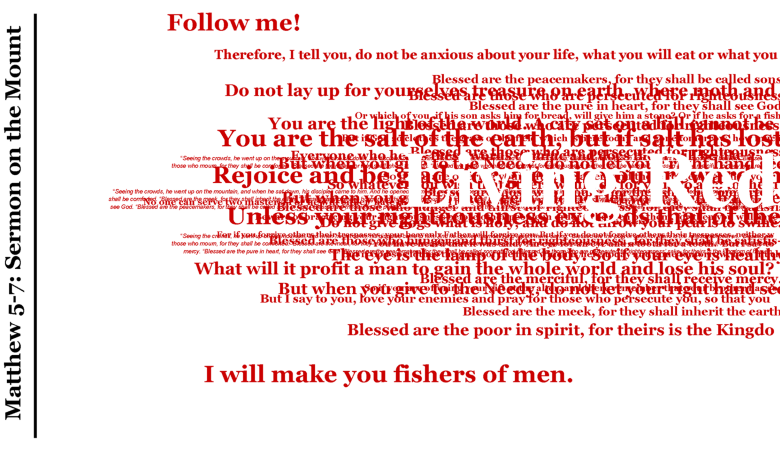Matthew 15:10-20, "What Defiles A Person?"
Our text comes in the middle of a string of 6 miracles. The first and the sixth are near identical miracles that deal with a multiplying of food. The miracles are broken up by a teaching. Pastor Joshua looked at the first part of this teaching over the past two weeks. The pharisees confront Jesus about why His disciples don’t wash their hands when they eat. If you’ll remember, this was not purely a matter of hygiene, and there was nothing in Scripture that commanded this behavior either. This was a law that had been placed on the people out of tradition passed down by some of the leaders, not by God. Jesus push back is that the Pharisees place these burdens on the people that don’t come from God, but yet, according to their traditions, they justify the breaking of God’s law. We left off last week looking Jesus’ quoting of the prophet Isaiah ; “This people honors me with their lips. but their heart is far from me; in vain do they worship me, teaching as doctrines the commandments of men.” That verse is the launchpad for our text today.[READ Matthew 15:8-20]
I went to a small Christian university. There were two different kinds of Christians at this university. Religion majors, and non-religion majors, and there was a major distinction. Both groups were full of people who loved the Lord and wanted honor Him in every aspect of their lives. However, they talked about God very differently. The religion majors would often use scholarly terms that the rest of us had never heard of. Even if the conversation was about a concept that everyone could understand, it would often become exclusive and make us non-religion majors feel like we couldn’t participate in our faith at the same level. Also, the general attitude was that the people who were most serious about their walk with the Lord were the religion majors. And that placed serious limitations on us non-religion majors in terms of opportunities for leadership and service. It was hurtful and discouraging for those of us who wanted to continue to grow in walk and service of the Lord but felt like that limitation had been placed on us by fellow students as well as professors and church leaders and pastors. It created scenes like the one we have here in Matthew with the small group of scholars discussing “finer” points of religion while the crowds were excluded for their ignorance.
So Jesus is in the city of Gennesaret, which is north west of the Sea of Galilee when the Pharisees travel all the way from to Jerusalem to confront Jesus. That’s a journey of approximately 180 km. The fact that the Pharisees traveled such a long way coneys the level of seriousness they placed on the issues they were confronting Jesus with. In verse 10, we see that “he called the people to him and said to them, “Hear and understand;” So this paints the picture that this conversation for whatever reason, wasn’t taking place in the midst of all the crowds because they had to be called over to Him. Perhaps the Pharisees had cornered him away from the crowds, or perhaps people were intimidated and were trying to show respect. Either way, it’s significant that Jesus calls the crowds to him to listen to the rest of the conversation. It was an invitation for everyone to participate in searching out the truth of their beliefs. Rather than leaving the theology to the “wise and studied ones”, Jesus includes everyone.
That’s the challenge to all of us; not to sit back and just follow the leaders, but to actively wrestle with the Word. To wrestle with it and come to understanding rather than mere compliance. If you know Christ, then you are to know Him deeply and intimately. Christ does not keep us at arms length. Whatever limitation, or degree, or level of education that man has placed on us, it’s just that... it’s from man. That’s not to say there isn’t value in something like seminary. For example, I’m very thankful that we have a senior pastor who has gone to seminary and has such great knowledge and ability to teach us, but seminary or Bible college is not a prerequisite for growing in our relationship with Jesus. He calls to us to hear and to understand. He calls to us to grow ever deeper in Him.
Verse 11. Jesus has already had a private or at least semi-private conversation with the Pharisees in which He pointed out their hypocrisy, but now He calls everyone to come and hear as he clearly and publicly dismisses some of the rules that were hanging over the people for their entire lives. It’s not what goes in, it’s what comes out. This constant obstacle and threat being unclean and hindered from worship was not from the Lord and had no value.
Verse 12. There are different opinions about the motives of this question. One opinion is that the disciples were asking if Jesus was aware of the consequences of what He had just done. “Hey Jesus, I know you might have gotten caught up in the crowd and all, but I was talking with some of the Pharisees after your little speech and they were pretty ticked. Not sure if you meant to do that, because I’m sure you didn’t, or maybe you just misspoke, or perhaps need to go clear things up with them? Just wanted to bring it to your attention.”
Another view is that this was simply prompting Jesus for a further explanation. If you’ll notice, after Jesus answers the question, Peter is kind of like, “Ok, yeah. I see. I get it. Um... I don’t get it. can you start at the beginning again? Jesus didn’t just point out the failings or narrow-mindedness of the Pharisees. He rejected and denounced some of the teachings that had been handed down from generation to generation by Israel’s leaders for the past several hundred years. This was a big pill to swallow, even for the disciples. Either way, we see that the setting has changed and that the dialogue is now just between Jesus and the disciples.
Verse 13-14. Jesus makes no apology for the Pharisees being offended. Anything not from God will be uprooted. Whether this is referring to false teachers or their false teachings, either way, it won’t hold up. But God’s truth is everlasting. All truth will one day be made known. Next He says to let them alone. This sounds harsh. Is Jesus saying that anyone who is ignorant is just out of luck? Obviously not, or else none of us would have ever had a chance to know grace. And let’s not forget what the first of this string of miracles was... Jesus was moved with compassion to heal the sick and feed the crowds. He was compassionate. He was not advocating selective compassion.
He says the let them alone because they are blind guides. Well... let’s just think about that for a second. What’s the difference between a blind person and a blind guide? Both are blind, which means that the guide has no more ability to see than the other blind people, but by asserting himself as a guide he falsely claims that he does. He says that he can actually see, and therefore lies, misleads, and endangers the other equally blind person who is following them. Jesus does not cut any slack for the Pharisee. There are no good intentions. Jesus has compassion for the blind and ignorant, but those who willfully reject the truth and willfully proclaim falsities are dangerous. They have rejected the compassion available to them.
Therefore, Jesus doesn’t walk on eggshells to protect the Pharisees from being offended. He owns the truth. He doesn’t compromise. And let’s not be foolish enough to think that we are allowed to be rude as long as we are correct, which is pride and arrogance. That’s not how Jesus acts here, but sometimes there is no polite way to state truth.
Also, the command for the disciple to leave the Pharisees alone is a warning for the disciples and us. Christ gave judgement to the blind guides because of their willful rejection of the truth, but if the blind person has also been shown the light and shown the blindness of his guide and yet still follows him, then his fate is the same. He also has become a plant that God did not plant and will be uprooted. He also falls into the pit. That’s why it is so important for us to actively search out the truth. To continually seek God and understand Him. That’s why I’m so thankful for this church and why I so value our responsibility to test and call our leaders. We must be careful, lest we follow a guide who leads us into a pit. A few weeks ago, you ordained me as your pastor, but if at any point it becomes clear that I am acting as a blind guide I do not expect you to bite your tongue and deal with it for the sake of my feelings or for the sake of not rocking the boat. I expect you to not follow me, to uninstall. We must fully take hold of truth and reject lies, no matter how familiar they may be, or sweet they may sound, or how much easier they may be to follow.
Verse 15 and 16. I love Peter. We always love to point at him and say silly Peter. There he goes putting his foot in his mouth again. I love Peter because I don’t feel so alone. And to be honest, I think we like to point at Peter so we don’t have to point at ourselves. But look at Jesus’ response in verse 16. When He says “you”, it is in the plural form. They all lacked understanding, just as we all do, but they are trying to understand.
Verse 17-18. Jesus explains that the extensive burdens about washing hands to avoid eating defiled food didn’t matter because the food literally passes through you into the toilet. He’s concerned with the condition of our hearts. Why? I think it’s easy for us to understand why Jesus couldn’t commend the Pharisees for ignoring and perverting parts of God’s law, but why not strive for every opportunity to command righteousness? We know from Matthew 5 that Jesus didn’t come to abolish the law, but to fulfill it. Please turn to Galatians 3:21-22. The law is not contrary to God’s promises. Further evidence that Jesus did not come to abolish it, but we see that the law was not perfectly sufficient. It was a road sign. A marker to direct us, a foreshadowing of what was to come. Verse 22, The promise would be given to those who believe by faith. Romans 10:10 tells us “with the heart one believes and is justified”. So now we see the true focus of this teaching. This is what these miracle have been pointing toward. Christ leads his disciples to looking beyond the materials, beyond the physical. He leads them to the heart of the issue, because that’s what He’s after, our hearts. Pun intended. That is how we are justified. That is how we can be forgiven. Not by the Law. Abiding by a set of dos and don’ts can’t give us life. But He asks the question “Are you still without understanding?” because that’s not something that should have been a mystery to them.
Let’s take a look at 1 Samuel 13:13-14. Saul had been chosen by God to be the first king of Israel. He was a mighty man. A head taller than everyone else. God put His Spirit on Saul and used him to bring deliverance from their enemies. Before one of the battles, he was supposed to wait for Samuel to come and offer sacrifices, but Samuel was late, and the men started to leave so Saul took things into his own hands and offered the sacrifices. As soon as he finishes, Samuel shows up and catches him red handed. [READ 1 Samuel 13:13-14] Notice the connections here. Saul’s kingdom will not be established forever because he disobeyed God’s command. Therefore, God chose another man and notice that it doesn’t say another man who will obey, but rather a man after God’s own heart. This clearly implies that disobedient Saul was not a man after God’s heart.
So let’s compare Saul and this man after God’s heart whom we know as David. In spite of Saul’s might, and valor, and victories, he is rejected for the way he broke God’s commands. But what about this man after God’s heart? Does this imply that he doesn’t disobey? Was David perfect? David committed adultery, and murder, and tried to cover it up. And later, when his son rapes David’s own daughter, he turns a blind eye to it! David had his sins. So then what’s the difference? Why is Saul rejected and David hailed as a man after God’s heart?
1 Samuel 15:22-26. Saul has disobeyed God’s commands again and is trying to justify himself by arguing that God should be pleased with his excellent sacrifices, and this is Samuel’s response: [READ 1 Samuel 15:22-26] Now let’s look at how David responds when he is confronted with his sin. Turn to Psalm 51. We don’t have time to unpack the depth of this Psalm, so we’re just going to look a few key verses. [READ Psalm 51:1-4, 10-17] Saul just wanted another sacrifice from Samuel, but David asks for a clean heart. Vs. 13 “Then I will teach transgressors your ways, and sinners will return to you” Vs 17. The sacrifices of God are a broken spirit; a broken and contrite heart, O God, you will not despise. That’s the real difference. Saul didn’t want God to hold sin against him because he wanted to continue being king. David wanted to be pure so that he could lead others to know and love the true king.
Turn back to Matthew 15:19-20. Luke 12:34 says “For where your treasure is, there your heart will be also. So looking at this list of sins in verse 19 we see that for the person who murders, their heart and treasure is set on vengeance, for the adulterer and the sexually immoral, it’s set on pleasure. Theft; the heart is focused on selfish gain. God desires the broken and contrite heart because that heart is concerned with forgiveness and redemption. That heart is concerned with praising the one who gave salvation. The broken and contrite heart’s treasure is Christ.
Earlier this week, I had just got my kiddos to bed. Kyla had a skype meeting later that evening and wasn’t feeling well, so she was lying down. I was trying to do some cleaning and I had a show playing in the background when Joshua popped over for something. We often don’t knock on each other’s doors but just go right in. So Joshua gets to the top of the stairs, looks around, looks at me and says “Are you watching Gilmore Girls???!!!” I said “Don’t judge me!”, but he did. Then I said, “Don’t mock me”, but he did. And now you all get to judge and mock me. I’m obviously not opposed to watching chick shows or chick flicks, which brings me to my real illustration. There’s a scene from a popular chick flick where a girl is torn between two different men. One is rough around the edges, and they fight a lot, but they’re head over heals in love with each other. The other guy is the perfect guy. He offers her the perfect cookie cutter life. She does not have the same love for him as for the rougher guy. In this scene, the rougher guy asks the girl what she wants. She doesn’t answer, so he keeps on asking and asking and begins to get heated. She can’t answer him because she’s confused. With either man will come marriage, a home, and children. But with one man, the motivating factor is the love for the man. With the other man, the motivating factor is that everything in their life would come with greater ease, respect, and wealth. Either way, she’s striving for the same things, but the man she chooses reveals whether she values love or money and worldly respect.
Jesus condemns the pharisees because their devotion to the law and avoiding defilement was ultimately out of a heart for personal gain, power, and pride. The greek word used for “defilement” means to made common. If something is made common, that means that it had previously been set apart. Saul and David were both anointed as King with oil to symbolize that God had set them apart as his servants. God desires for us all to be set apart to be his servants, to be holy. We can try to do, and achieve, and comply with the restrictions that morality and religion places on us so we can perhaps one day earn eternal security. Or, we can confess our sins. We can flaunt our mistakes and our struggles. We can be made new, given a new heart, and we can teach others about the hope, peace, forgiveness, and love that we have found. Laws cannot give life. That is only found by faith in Christ.
Christ invites everyone to understand Him, not just the scholars. He invites everyone to wrestle with these truths. He commands us all to examine our hearts and our ways. What sins do we see in our lives? That will be an indication of where our hearts are straying. What extra requirements have we placed on our lives trying to be good? What “good deeds” do we try to mark off our checklist every day. These might be good things, but we might be doing them with a selfish heart. We must strive for a broken and contrite heart that is motivated by faith in Christ’s sacrifice.
PRAY. We are going to take the Lord’s supper in just a few moments. [READ 1 Corinthians 11:27-29] This goes perfectly with our text from this morning. Please take the next few minutes to examine your hearts. Examine the motives of our actions. Search for unconfessed sin. Confess and repent of that before God during this time. I will ask the deacons and nursery parents to please go retrieve all of the children’s classes and please continue in a spirit of prayer and reflection when you return.
Series Information

The Gospel of Matthew is a story about a once and coming King. Jesus of Nazareth is the Son of David, the long awaited for Messiah. He has come once, and Matthew tells the story of His arrival, ministry, sacrificial atoning work on the cross, and His promise to return soon.






